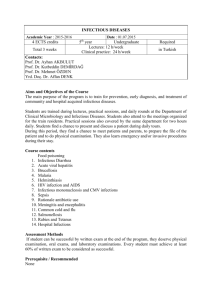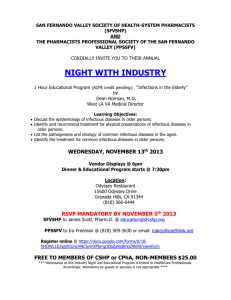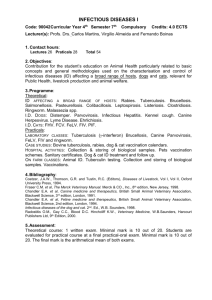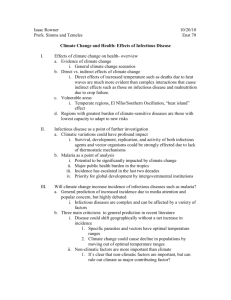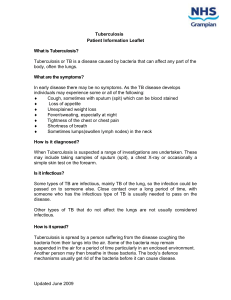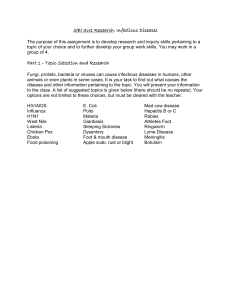Week 1 - Society for Medical Anthropology
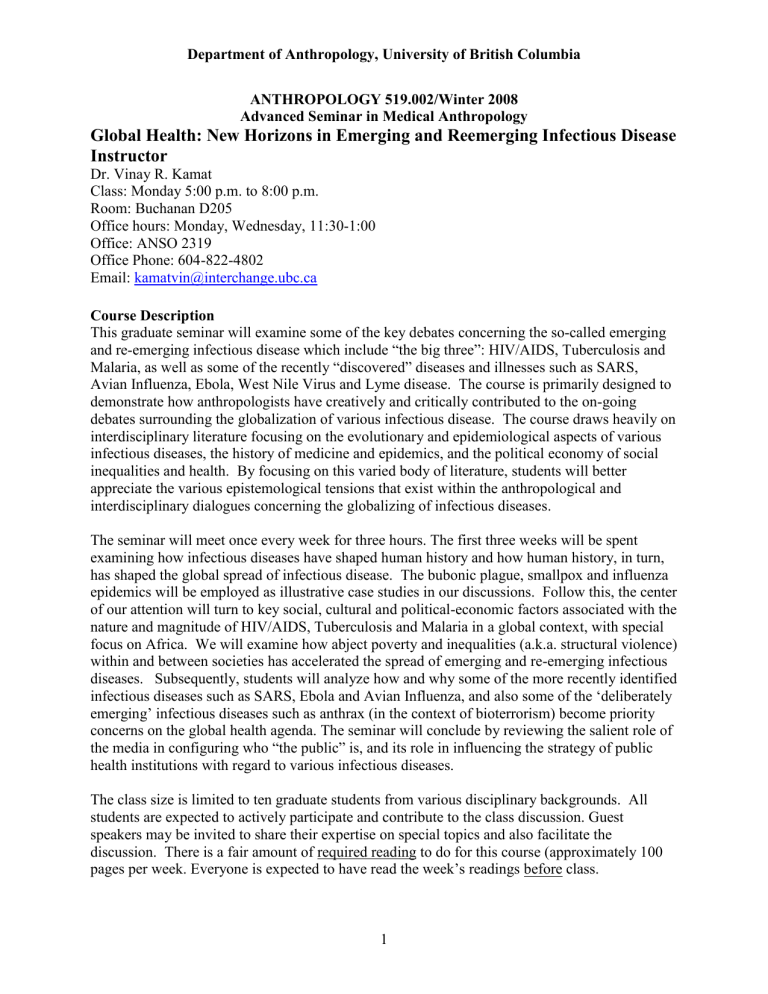
Department of Anthropology, University of British Columbia
ANTHROPOLOGY 519.002/Winter 2008
Advanced Seminar in Medical Anthropology
Global Health: New Horizons in Emerging and Reemerging Infectious Disease
Instructor
Dr. Vinay R. Kamat
Class: Monday 5:00 p.m. to 8:00 p.m.
Room: Buchanan D205
Office hours: Monday, Wednesday, 11:30-1:00
Office: ANSO 2319
Office Phone: 604-822-4802
Email: kamatvin@interchange.ubc.ca
Course Description
This graduate seminar will examine some of the key debates concerning the so-called emerging and re-emerging infectious disease which include “the big three”: HIV/AIDS, Tuberculosis and
Malaria, as well as some of the recently “discovered” diseases and illnesses such as SARS,
Avian Influenza, Ebola, West Nile Virus and Lyme disease. The course is primarily designed to demonstrate how anthropologists have creatively and critically contributed to the on-going debates surrounding the globalization of various infectious disease. The course draws heavily on interdisciplinary literature focusing on the evolutionary and epidemiological aspects of various infectious diseases, the history of medicine and epidemics, and the political economy of social inequalities and health. By focusing on this varied body of literature, students will better appreciate the various epistemological tensions that exist within the anthropological and interdisciplinary dialogues concerning the globalizing of infectious diseases.
The seminar will meet once every week for three hours. The first three weeks will be spent examining how infectious diseases have shaped human history and how human history, in turn, has shaped the global spread of infectious disease. The bubonic plague, smallpox and influenza epidemics will be employed as illustrative case studies in our discussions. Follow this, the center of our attention will turn to key social, cultural and political-economic factors associated with the nature and magnitude of HIV/AIDS, Tuberculosis and Malaria in a global context, with special focus on Africa. We will examine how abject poverty and inequalities (a.k.a. structural violence) within and between societies has accelerated the spread of emerging and re-emerging infectious diseases. Subsequently, students will analyze how and why some of the more recently identified infectious diseases such as SARS, Ebola and Avian Influenza, and also some of the ‘deliberately emerging’ infectious diseases such as anthrax (in the context of bioterrorism) become priority concerns on the global health agenda. The seminar will conclude by reviewing the salient role of the media in configuring who “the public” is, and its role in influencing the strategy of public health institutions with regard to various infectious diseases.
The class size is limited to ten graduate students from various disciplinary backgrounds. All students are expected to actively participate and contribute to the class discussion. Guest speakers may be invited to share their expertise on special topics and also facilitate the discussion. There is a fair amount of required reading to do for this course (approximately 100 pages per week. Everyone is expected to have read the week’s readings before class.
1
Department of Anthropology, University of British Columbia
REQUIRED BOOKS (available at the UBC bookstore, online, and on the reserve shelf under ANTH 519.002 at the Koerner Library)
The required and recommended books have been placed on the reserve shelf (ANTH 519.002) at the Koerner Library. A master copy of the folder (“Coursepack”) containing all the articles is with the instructor. You may borrow it to make copies of the articles on your own.
1.
Infections and Inequalities: The Modern Plagues by Paul Farmer Berkeley: University of
California Press. Publisher: University of California Press (February 5, 2001) ISBN:
0520229134 (Paper) [Read Select Chapters]
2. Stories in the Time of Cholera: Racial Profiling during a Medical Nightmare by Charles L. Briggs , Clara Mantini-Briggs Publisher: University of California Press;
Publisher: University of California Press (November 1, 2004) ISBN: 0520243889 (Paper)
[Read Full Book]
3. SARS in China: Prelude to Pandemic? by Arthur Kleinman (Editor), James Watson
Publisher: Stanford University Press (July 1, 2004) ISBN: 0804753148 (Paper) [Read Select
Chapters]
RECOMMENDED BOOKS (On reserve at Koerner Library)
1. Plagues and Poxes: The Impact of Human History on Epidemic Disease by Alfred J.
Bollet, Publisher: Demos Medical Publishing (October 2003) ISBN : 188879979X (Paper)
2. Disease and the Modern World: 1500 to the Present Day by Mark Harrison . Publisher:
Polity Press (May 1, 2004) ISBN: 0745628109 (Paper)
3.
Epidemics and History: Disease, Power, and Imperialism by Sheldon Watts Publisher:
Yale University Press (November 10, 1999) ISBN: 0300080875 (Paper)
4. Betrayal of Trust: The Collapse of Global Public Health by Laurie Garrett Publisher:
Hyperion (August, 2001) ISBN: 0786884401 (Paper)
5. America's Forgotten Pandemic: The Influenza of 1918 by Alfred W. Crosby Publisher:
Cambridge University Press (January 26, 1990) ISBN: 0521386950 (Paper)
6. White Plague, Black Labor: Tuberculosis and the Political Economy of Health and
Disease in South Africa by Randall M. Packard Publisher: University of California Press
(June 1, 1990) ISBN: 0520065751
7.
Emerging Illnesses and Society : Negotiating the Public Health Agenda by Randall M.
Packard , Ruth L. Berkelman , Howard Frumkin , Peter J. Brown Publisher: The Johns Hopkins
University Press (July 28, 2004) ISBN: 0801879426 (Hardcover) [Read Select Chapters]
2
Department of Anthropology, University of British Columbia
8 . The Making of a Tropical Disease: A Short History of Malaria (Johns Hopkins
Biographies of Disease) (Hardcover) by Randall M. Packard Publisher : The Johns Hopkins
University Press; 1 edition (December 18, 2007) ISBN -10: 0801887127 ISBN -13: 978-
0801887123
9. The Malaria Capers: More Tales of Parasites and People, Research and Reality by
Robert S. Desowitz Publisher: W. W. Norton & Company; Reprint edition (June 1, 1993)
ISBN: 0393310086 (Paper)
10. Global AIDS: Myths and Facts, Tools for Fighting the AIDS Pandemic by Alexander
Irwin and Joyce Millen Publisher: South End Press (November 1, 2002) ISBN: 0896086739
11. The Return of the White Plague: Global Poverty and the 'New' Tuberculosis by
Matthew Gandy and Alimuddin Zumla (Editors). Publisher: Verso (August 14, 2003) ISBN:
1859846696 (Hardcover)
12. Twenty-First Century Plague: The Story of SARS by Thomas Abraham . Baltimore: Johns
Hopkins University Press. Publisher: The Johns Hopkins University Press (January 1, 2005)
ISBN: 0801881242 (Hardcover)
13.
Health Policy in a Globalising World by Kelley Lee , Kent Buse , and Suzanne Fustukian
(eds) Publisher: Cambridge University Press; 1st edition (August 8, 2002) ISBN: 052100943X
(Paper)
Course Requirements and Grading
Research Paper (20-25 pages)
→ Due April 11 th
50%
Reaction papers (Two, three pages each) → Due February 15 th and April 11 th 10%
Book Reviews (Two, five pages each)
→ Due March 17 th
and April 11 th
10%
Class Participation and Presentation
→ ~~~~~~~~~~~~~~ 30%
Reaction Papers (Two Short Reading Commentaries worth five points each)
These reading commentaries (3 pages max, typed, double-spaced) should be your personal and intellectual reaction to any one of the required books, and any two of the required articles
(together). Reaction papers should not be a summary of the book or the articles you have read, rather they should be treated as a springboard for your own thoughts, experiences, and connections with other readings. They should not be a reiteration or exegesis of reviews of these books/ chapters/ articles done by other scholars. What matters most in regard to the reactions papers are your own thoughts and ideas, your analytical assessment of the positive and/or negative aspects of the book/chapter/article. Like all good essays, your reaction papers should include an introductory paragraph stating your main premise, a body where your detail your ideas, and a brief concluding paragraph. A typical reaction paper begins with a small discussion on the main focus of the article/paper and then seeks to address: How does the book/article connect with your coursework in general? What is your reaction to the ideas being discussed?
Did your opinion change about some of the ideas change as you read the book/article? If so, what convinced you or did not convince you and why? Finally, what did you learn or did not learn from the book/article? Did anything surprise you? If so, what? And so on. For this course at
3
Department of Anthropology, University of British Columbia least, use active voice. Passive tense sounds amorphous and wishy-washy. The use of first person
("I") is appropriate for these reaction papers. Avoid overly complex sentences. Correct spelling and grammar are appreciated as they improve the clarity of your paper. The following is a very useful website for you to visit and get a good sense of what a reaction paper entails. http://leo.stcloudstate.edu/acadwrite/reaction.html
Final Research Paper (Referenced Ethnography Paper/Reflection and Synthesis Project)
Students will write one coherent, well-structured essay on a subject related to the themes covered in class. This paper will count as 50% of the final grade. Topics should be selected by March 17
2008. A preliminary outline of the final term paper—two pages in length (typed, double-spaced)
— must be submitted to me by March 24, 2008. You will need to write the paper based on a combination of the materials you will read for this class and the materials you will research in the library. The specific topic on which you will write the paper may be decided in consultation with me. The length of the paper should be 20-25 typed pages, double-spaced.
Please use the AAA Style Guide for the references and the format of the paper. You can access the AAA Style Guide at: http://www.aaanet.org/pubs/style_guide.pdf
Discussion Responsibility and Class Participation
This is a significant portion of your grade, and it is measured in various ways. Most importantly, it includes keeping up with your readings and making thoughtful contributions to class discussions. Therefore, regular class attendance is very important. Your participation in class discussions will be enhanced if you read the assigned material well in advance.
As for the class presentations, a sign-up sheet will be circulated on January 21, 2008. Each discussion leader should present a brief summary at the start of each class of the required readings and (if possible) of the supplementary readings. Please make sufficient copies of the synopsis so that it may be distributed to all of your classmates; this is so that your classmates can read the synopsis prior to the session in which the readings will be discussed. You will present the material from your synopsis in class and lead the discussion. Every student will participate in at least one presentation over the semester. Given the class size, you will be asked to make a
25-30 minute presentation in order to engage the class in a critical discussion on the issues raised during your presentation. Please submit to me an individual summary (one page) on the themes covered in the readings for that week, and their relation to the broader context of the course.
I suggest that you use the following format to prepare for your class presentation: 1) Identify one or two short passages from the readings that you think are central to the main argument made in the article/chapter. Paraphrase the passage and describe the argument that the author makes in your own words 2) propose one or more questions from the passages that you have selected, and bring them up for discussion with your classmates. Please turn in to me a copy of your review/notes (typed, double-spaced, including the passages selected, your critical response, argument descriptions, and proposed questions, not more than two pages). This review should be submitted to me as a hardcopy. Please make sure to label the review: Anthro 519.002.2008 the week and date followed by your name.
4
Department of Anthropology, University of British Columbia
Evaluation: Your presentation, which includes your performance as a discussion leader will be assigned a grade in increments of a full letter grade (i.e., A, B, C, D, etc.). The evaluation will be based on both your written notes and your contribution to the presentation/team work.
Policies
All papers must be turned in on time. In fairness to all students who have met the deadline, late papers will be marked down by half a letter grade for every day they are late, with exceptions made only for severe illness or emergency. If extraordinary circumstances prevail that make it impossible for you to meet a deadline, please contact me as soon as possible (prior to turning in late work for review). Deferrals and incompletes will be given only in accordance with UBC policy as set forth in the catalogue. Unless you are already familiar with UBC’s Office of Equity and its policies, I would urge you to do so. Furthermore, please revisit UBC’s policy on plagiarism.
Please make a note of my office hours, and do not hesitate to discuss any concerns that you may have about class material, assignments or grading during my office hours. If you are unable to see me during scheduled office hours on any of the two days, you should schedule an appointment with me, well in advance, and preferably via email.
5
Department of Anthropology, University of British Columbia
General Schedule/Topics
1. Week 1
Medical Anthropology, Global Health, and Emerging and
Reemerging Infectious Disease: An Overview
2. Week 2
Impact of Human History on Epidemic Disease
3. Week 3
Impact of Epidemic Disease on Human History
4. Week 4
HIV/AIDS–Nature and Magnitude of the Global Pandemic
5. Week 5
HIV/AIDS–Focus on Africa
6. Week 6
Tuberculosis–Nature and Magnitude of the White Plague
7. Week 7
The “New” Tuberculosis–Multi-drug Resistant Tuberculosis
8. Week 8
Malaria–Remembering a Forgotten Disease
9. Week 9
Malaria–Resistance, Resurgence, and the Way Forward
10. Week 10
Cholera–Return of a Primordial Disease?
11. Week 11
SARS and Avian Influenza–Hype and Reality
12. Week 12
Easter Monday, University Closed
13. Week 13
SARS, Avian Influenza and the Media
14. Week 14
Conspiracy Theory, Bioterrorism and the Media: What Next?
6
Department of Anthropology, University of British Columbia
Required Readings and Lecture Schedule
(Compiled in a Reading Package)
Week 1. Medical Anthropology, Global Health, and Emerging and
Reemerging Infectious Disease: An Overview
Monday, 07 January 2008
First hour: Introduction and necessary preliminaries: overview of the course, syllabus, instructor’s and students’ expectations.
Brown, Peter J., Ronald L. Barrett, and Mark B. Padilla
1998 Medical anthropology: an introduction to the fields. In Understanding and
Applying Medical Anthropology. Pp. 10-19: Mountain View: Mayfield.
Fauci, Anthony S., et al.
2005 Emerging infectious diseases: a 10-year perspective from the National Institute of
Allergy and Infectious Diseases. Emerging Infectious Diseases 11(4):519-525.
Morens, David M., et al.
2004 The challenge of emerging and re-emerging infectious diseases. Nature 430(8
July):242-249.
Fauci, Anthony
2005 Emerging and reemerging infectious diseases: The perpetual challenge. 2005 Robert
H. Ebert Memorial lecture. Milbank Memorial Fund. New York: Milbank Memorial
Fund.
Morse, Stephen S.
1995 Factors in the emergence of infectious diseases. Emerging Infectious Diseases
1(1):7-15.
Van Damme, Wim and Van Lerberghe, Wim
2000 Epidemics and Fear (Editorial). Tropical Medicine and Hygiene. 5(8):511-514.
Week 2. Impact of Human History on Epidemic Disease
Monday, 14 January 2008
Armelagos, George J., Peter J. Brown, and Bethany Turner
2005 Evolutionary, historical and political economic perspectives on health and disease.
Social Science & Medicine 61(4):755-765.
Barrett, Ronald, et al.
1998 Emerging and re-emerging infectious diseases: the third epidemiologic transition.
Annual Review of Anthropology 27:247-271.
Packard, Randall, et al.
2004 Introduction: Emerging illness as social process. In Emerging Illnesses and Society.
Packard Randall, et al. eds. Pp. 1-35. Baltimore and London: The Johns Hopkins
University Press.
Bollet, Alfred J.
2004 Plagues and Poxes: The Impact of Human History on Epidemic Disease. New
York: Demos. (Chapters on Bubonic Plague, Smallpox, and The Great Influenza
Pandemic of 1918-1919)
Farmer, Paul
7
Department of Anthropology, University of British Columbia
2001 Rethinking “emerging infectious diseases.” In Infections and Inequalities: The
Modern Plagues. Paul Farmer. Pp. 37-58. Berkeley: University of California Press.
Inhorn, Marcia C., and Peter J. Brown
1997 Introduction: The Anthropology of Infectious Disease: International Health
Perspectives. Amsterdam: Gordon and Breach Science Publishers.
Week 3. Impact of Epidemic Disease on Human History
Monday, 21 January 2008
Risse, Guenter B.
1988 Epidemics and history: Ecological perspectives and social responses. In AIDS:
The Burdens of History. Elizabeth Fee and Daniel M. Fox, ed. Pp. 22-66. Berkeley,
CA: University of California Press.
Lindenbaum, Shirley
2001 Kuru, prions, and human affairs: Thinking about epidemics. Annual Review of
Anthropology 30:363-385.
Harrison, Mark
2004 Disease and the Modern World: 1500 to the Present Day. Cambridge: Polity
Press. (Select chapters).
Watts, Sheldon
1997 Epidemics and History: Disease, Power and Imperialism. New Haven: Yale
University Press. (Select chapters).
Week 4. HIV/AIDS—Nature and Magnitude of the Global Pandemic
Monday, 28 January 2008
Schoepf, Brooke Grundfest
2004 AIDS, history, and struggles over meaning. In HIV & AIDS in Africa: Beyond
Epidemiology. Ezekiel Kalipeni et al. Pp.15-28. Malden, MA.Blackwell Publishing.
Farmer, Paul
2001 Culture, poverty, and HIV transmission. In Infections and Inequalities: The Modern
Plagues. Paul Farmer. Pp. 127-149. Berkeley: University of California
Press.
Parker, Richard
2002 The global HIV/AIDS pandemic, structural inequalities, and the politics of international health. American Journal of Public Health 92(3):343-346.
Gayle, Helene D.
2003 Curbing the global AIDS Epidemic. New England Journal of Medicine
348(18):1802-1805.
Fielder, Jon F., et al.
2003 The AIDS pandemic. New England Journal of Medicine 349(8):814-815.
Shapiro, Roger L.
2002 Drawing lines in the sand: the boundaries of the HIV pandemic in perspective.
Social Science and Medicine 55:2189-2191.
Week 5. HIV/AIDS—Focus on Africa
Monday, 04 February 2008
Wojcicki, Janet Maia
8
Department of Anthropology, University of British Columbia
2002 "She drank his money": Survival sex and the problem of violence in taverns in
Gauteng Province, South Africa. Medical Anthropology Quarterly 16(3):267-293.
Gysels, Marjolein., et al.
2002 Women who sell sex in a Ugandan trading town: life histories, survival strategies and risk. Social Science and Medicine 54(2):179-192.
Parkhurst, Justin O., and Louisiana Lush
2004 The political environment of HIV: lessons from a comparison of Uganda and
South Africa. Social Science and Medicine 59:1913-1924.
Abdool, Karim Salim S.
2005 The African Experience. In The AIDS Pandemic: Impact on Science and Society.
Kenneth H. Mayer and H.F. Pfizer, ed. Pp. 351-373. London: Elsevier Academic
Press.
Oppong, Joseph R. and Ezekiel Kalipeni
2004 Perceptions and misperceptions of AIDS in Africa. In HIV & AIDS in Africa:
Beyond Epidemiology. Ezekiel Kalipeni et al. Pp.47-57. Malden, MA. Blackwell
Publishing
Schneider, Helen
2002 On the fault-line: The politics of AIDS policy in contemporary South Africa.
African Studies 61(1):145-167.
Reich, Michael R, and Priya Bery
2005 Expanding global access to ARVs: The challenges of prices and patents. In The
AIDS Pandemic: Impact on Science and Society. Kenneth H. Mayer and H.F. Pfizer, ed. Pp. 324-350. London: Elseiver Academic Press.
Week 6. Tuberculosis—Nature and Magnitude of the White Plague
Monday, 11 February 2008
Gandy, Matthew, and Alimuddin Zumla
2002 The resurgence of disease: social and historical perspectives on the 'new' tuberculosis. Social Science and Medicine 55:385-396.
Frieden, Thomas R., and Cynthia R. Driver
2003 Tuberculosis control: past 10 years and future progress. Tuberculosis 83(1-3):82.
Kaufmann, Stefan H. E.
2003 A short history of Robert Koch's fight against tuberculosis: Those who do not remember the past are condemned to repeat it. Tuberculosis 83(1-3):86.
Packard, Randall M.
1989 White Plague, Black Labor: Tuberculosis and the Political Economy of Health and Disease in South Africa. Berkeley: University of California Press.
Week 7. The New Tuberculosis—Multi-drug Resistant Tuberculosis
Monday, 18 February 2008 MID-TERM BREAK – READ ON YOUR OWN
Gandy, Matthew, and Alimuddin Zumla, eds.
2003 The Return of the White Plague: Global Poverty and the New Tuberculosis.
London: Verso. (Select Chapters – Introduction, 1, 3, 5, 7, 9, 10, 11,)
Farmer, Paul
9
Department of Anthropology, University of British Columbia
2003 A plague on all our houses? Resurgent tuberculosis inside Russia's prisons
(Chapter 4). In Pathologies of Power: Health, Human Rights, and the New War on the Poor. Paul Farmer. Pp. 115-133. Berkeley: University of California Press.
Farmer, Paul
2001 Immodest claims of causality: Social scientists and the “new” tuberculosis. In
Infections and Inequalities: The Modern Plagues. Paul Farmer. Pp. 228-261. Berkeley:
University of California Press.
Yong, Kim Jim, et al.
2005 Limited good and limited vision: multidrug-resistant tuberculosis and global health policy. Social Science & Medicine 61(4):847-859.
Week 8. Malaria—Remembering a Forgotten Disease
Monday, 25 February 2008
Packard, Randall
2007 The Making of a Tropical Disease: A Short History of Malaria. Baltimore: The Johns
Hopkins University Press (Select Chapters).
Desowitz, Robert S.
1993 The Malaria Capers: More Tales of Parasites and People, Research and Reality. New
York. W. W. Norton and Company; Reprint edition.
Attaran, Amir, et al.
2004 WHO, the Global Fund, and medical malpractice in malaria treatment. The Lancet
363(January 17):237-240.
Poore, Peter
2004 The Global Fund to fight AIDS, tuberculosis and malaria. Health Policy and
Planning 19(2):52-53.
Week 9. Malaria—Of Resistance, Resurgence and the Way Forward
Monday, 03 March 2008
Breman, Joel G., et al.
2004 Conquering the intolerable burden of malaria: What's new, what's needed: A summary. American Journal of Tropical Medicine and Hygiene 71(2):1-15.Brown,
Malowany, Maureen
2000 Unfinished agendas: Writing the history of medicine of Sub-Saharan Africa.
African Affairs 99:325-349.
Brown, Peter J.
1997 Culture and the global resurgence of malaria. In The Anthropology of Infectious
Disease. Marcia Inhorn and Peter J. Brown, ed. Pp. 119-141. Amsterdam: Gordon and
Breach Science Publishers.
Nchinda, Thomas C.
1998 Malaria: A reemerging disease in Africa. Emerging Infectious Diseases 4(3):398-
403.
Mackinnon, M. J, and I.M. Hastings
1988 The evolution of multiple drug resistance in malaria parasites. Transactions of the
Royal Society of Tropical Medicine and Hygiene 9(2):188-195.
Baird, J. Kevin
10
Department of Anthropology, University of British Columbia
2005 Effectiveness of antimalarial drugs. New England Journal of Medicine 352
(15):1565-1577.
Bloland, Peter B.
2003 A contrarian view of malaria therapy policy in Africa. American Journal of Tropical
Medicine and Hygiene 68(2):125-126.
White, Nicholas J.
2004 Antimalarial drug resistance. The Journal of Clinical Investigation 113(8):1084-
1092.
Kamat, Vinay R.
2000 Resurgence of malaria in Bombay (Mumbai) in the 1990s: a historical perspective.
Parassitologia 42:135-148.
Week 10. Cholera—Return of a Primordial Disease?
Monday, 10 March 2008
Nations, Marilyn K, and Christina G. Monte
1996 "I'm not dog, no!" Cries of resistance against cholera control campaigns. Social
Science and Medicine 43:1007-1024.
Briggs, Charles L, and Clara Mantini-Briggs
2003 Stories in the Time of Cholera: Racial Profiling During a Medical Nightmare.
Berkeley: University of California Press. (Select Chapters)
Briggs, Charles L.
2003 Why nation-states and journalists can't teach people to be healthy: power and pragmatic miscalculation in public discourses on health. Medical Anthropology
Quarterly 17(3):287-321.
Week 11. SARS and Avian Influenza—Hype and Reality
Monday, 17 March 2008
Peiris, Joseph S. M., et al.,
2003 The Severe Acute Respiratory Syndrome. New England Journal of Medicine
349(25):2431-2441.
Lee, Nelson, et al.,
2003 A major outbreak of Severe Acute Respiratory Syndrome in Hong Kong. New
England Journal of Medicine 348(20):1986-1994.
Kleinman, Arthur, and James Watson, eds.
2004 SARS in China: Prelude to Pandemic? Palo Alto: Stanford University Press (Select
Chapters).
Abraham, Thomas
2005 Twenty-First Century Plague: The Story of SARS. Baltimore: Johns Hopkins
University Press.
Weinstein, Robert A.
2004 Planning for Epidemics – The Lessons of SARS. New England Journal of Medicine
350(23):2332-2334.
Wenzel, Richard P., and Michael B. Edmond
2003 Managing SARS amidst uncertainty. New England Journal of Medicine
348(20):1947-1948.
Monto, Arnold S.
11
Department of Anthropology, University of British Columbia
2005 The threat of an avian influenza pandemic. New England Journal of Medicine
352(4):323-325.
Week 12.
Monday, 24 March 2008 Easter Monday, University Closed
Read, Read, Read!
Week 13. SARS, Avian Influenza and the Media
Monday, 31 March 2008
Blendon, Robert J., et al.,
2004 The public's response to Severe Acute Respiratory Syndrome in Toronto and the
United States. Clinical Infectious Diseases 38:925-931.
Tomislav, Svoboda, et al.,
2004 Public Health Measures to Control the Spread of the Severe Acute Respiratory
Syndrome during the Outbreak in Toronto. New England Journal of Medicine
350(23):2352-2361.
Eichelberger, Laura
2007 SARS and New York’s China Town: The politics of risk and blame during an epidemic of fear. Social Science and Medicine 65:1284-1295.
Ali, Harris S. and Roger Keil
2006 Global cities and the spread of infectious disease: The case of severe acute respiratory syndrome (SARS) in Toronto, Canada. Urban Studies 43(3):491-509
Washer, Peter
2003 Representations of SARS in the British newspapers. Social Science and Medicine
59:2561-2571.
Wallis, Patrick, and Brigitte Nerlich
2005 Disease metaphors in new epidemics: the UK media framing of the 2003 SARS epidemic. Social Science and Medicine 60(11):2629-2639.
Wilson, Nick, et al.,
2004 Print media response to SARS in New Zealand. Emerging Infectious Diseases
10(8):1461-1464.
Zahn, Mei
2005 Civet cats, fried grasshoppers, and David Beckham's pajamas: Unruly bodies after
SARS. American Anthropologist 107(1):31-42.
Week 14. Conspiracy Theory, Bioterrorism and the Media: What Next?
Monday, 07 April 2008
Berkelman, Ruth L., and Phyllis Freeman
2004 Emerging infections and the CDC response. In Emerging Illnesses and Society.
Randall Packard, Peter J. Brown, Ruth L. Berkelman, and Howard Frumkin, eds. Pp.
350-387. Baltimore and London: The Johns Hopkins University Press.
Ashford, David A., Robyn M. Kaiser, et al.,
2003 Planning against biological terrorism: Lessons from outbreak investigations.
Emerging Infectious Diseases 9(5):515-519.
Covello, Vincent T., et al.,
12
Department of Anthropology, University of British Columbia
2001 Risk communication, the West Nile virus epidemic, and bioterrorism: Responding to the communication challenges posed by the intentional or unintentional release of a pathogen in an urban setting. Journal of Urban Health 78 (2):382-391.
Samaan, Gina, et al.,
2005 Rumor surveillance and Avian influenza H5N1. Emerging Infectious Diseases
11(3):463-466.
St. John, Ronald K., et al.,
2005 Border screening for SARS. Emerging Infectious Diseases 11(1):6-10.
Walden, Johan, and Edward H. Kaplan
2004 Estimating time and size of bioterror attack. Emerging Infectious Diseases
10(7):1202-1205.
SUMMING UP
13

